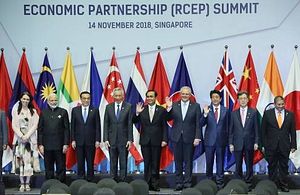Japanese Prime Minister Shinzo Abe performed a delicate balancing act regarding China as he attended a series of regional summits this month.
Abe noted repeatedly that during his recent trip to China – the first such official visit in seven years – both sides had agreed to play a constructive role for peace and prosperity of the international community. That did not prevent Abe from raising concerns in a number of key areas.
In Singapore, at a meeting of ASEAN Plus Three on November 15, Abe delivered a pointed message with China apparently in mind when he warned that “substandard infrastructure investments” that fall short of international standards “could compromise sustainable prosperity of the region.” That forum brings members of the Association of Southeast Asian Nations together with Japan, China, and South Korea. Abe, according to a Japanese government readout, noted that Tokyo would “promote the development of quality infrastructure that ensures openness, transparency, economic efficiency in view of life-cycle cost, and fiscal soundness including debt sustainability of the recipient countries.”
At the 13th East Asia Summit, held in Singapore on the same day, Abe renewed calls for an effective code of conduct for the South China Sea, where China has been criticized for its land reclamation work in disputed territory. Declaring that Japan had “serious concerns” about the developments, Abe added: “Actions that seek to unilaterally change the status quo through militarization of disputed features threaten the interests of countries that utilize common resources in the South China Sea that support peace and stability of the entire region.” (In a speech in Singapore, Chinese Premier Li Keqiang indicated that Beijing would strive to finish negotiations on a South China Sea Code of Conduct within the next three years, because a consensus-based resolution would “go a long way to advancing regional peace and development.”)
On the other hand, Abe took care to emphasize that his vision for a free and open Indo-Pacific did not exclude any countries. Such initiatives, he said, would “benefit all countries in the region, large and small, and we will cooperate with all those who share these views.”
The Japanese leader also joined with China in criticizing the rise of trade protectionism, and called for the swift conclusion of the Regional Comprehensive Economic Partnership (RCEP), which includes Beijing. “The spectacular economic growth of East Asia has resulted from trade and investment based on free and fair rules,” Abe told the East Asia Summit.
The 16 countries participating in the RCEP negotiations had held another summit in Singapore on the previous day, November 14. Abe advocated for “an inclusive RCEP” that “pushes the economic level of each country to the next stage” and whose benefits were widely shared. In a joint leaders’ statement, the RCEP participants said they were determined to conclude a modern, comprehensive, high quality, and mutually beneficial agreement in 2019.
During the RCEP meeting, Abe promoted Japan’s recent role in leading the negotiations of TPP11, the trade deal formally known as the Comprehensive and Progressive Agreement for Trans-Pacific Partnership, which is due to enter into force by the end of 2018.
Abe suggested that it was important to develop a worry-free business environment. It was therefore “necessary to protect intellectual property, to develop an environment where companies and consumers can engage in electronic commerce safely and freely and can compete fairly, and to improve customs procedures for the facilitation of trade.” These are points frequently raised by the United States and others in criticizing China’s trade practices. In various engagements in Singapore, Abe signaled his support for reform of the World Trade Organization (WTO).
Li argued that the rules-based multilateral trading system should be respected and upheld. The Chinese premier admitted that the WTO rules “do fall short in some respects, which ought to be brought up to date by reforms,” but added some caveats. In a public lecture, Li said principles guiding such reform should include maintaining the overall direction of trade liberalization; upholding the basic principles of openness, transparency, inclusiveness, and nondiscrimination; and rejecting any attempts to “dismantle the current system or build a new one.”

































